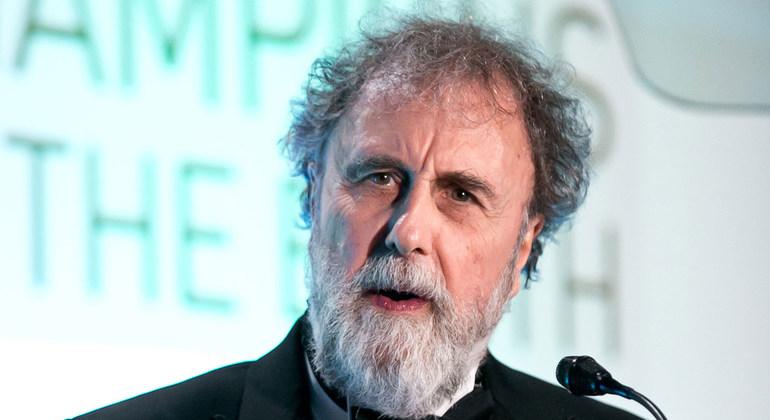An Interview with Sir Bob Watson, former IPBES Chair

We sat down with Sir Bob Watson, former chair of the Intergovernmental Science-Policy Platform on Biodiversity and Ecosystem Services (IPBES) to talk about mainstreaming biodiversity, the IPBES global assessment, next year’s biodiversity COP in Kunming, China, and more.
What is the case for mainstreaming biodiversity considerations into government decisions, so that nature isn’t simply understood as only the concern of environmental and natural resource ministries?
Biodiversity, just like climate change, is a development issue. They both affect food security, water security and human health. They are both economic issues. Biodiversity is incredibly valuable, and we need to take that value into accounting systems and into decision-making. It is also a security issue—when you lose biodiversity or you change the climate, it displaces people in different parts of the world. Finally, it's a moral value—why should we actually destroy nature? So, biodiversity is far more than simply an environmental issue!
Looking ahead to the biodiversity COP next year in China, what are you hoping to see?
One of the key conclusions of the IPBES report is that we’re failing to meet most of the current 20 Aichi targets. I believe that targets without actions will not be meaningful. We need to come out of China, not just with potential new targets, but with a set of actions on how we can implement sustainable consumption and production while safeguarding ecosystems.
We also need governments to work with the private sector, to work with the NGOs and academia. We need everyone involved. Furthermore, we need to have what we call cross-sectoral action. You can’t look at agriculture separately from water, separately from energy, separately from transportation. We need the sectors to work together.
What are some things that can be done with respect to how to manage the economy?
We need to evolve the economic system and make sure that natural capital complements GDP and is brought into decision-making. We need to eliminate perverse subsidies on agriculture, transportation, and energy, and we need to embrace the circular economy. We need to stimulate incentives for conservation and the sustainable use of biodiversity. There are many things that are quite actionable today.
Biodiversity loss, like climate change, is a massive long-run challenge. What kind of analysis do we need in order to deal with an issue whose ramifications stretch far into the future?
Future assessments of biodiversity loss or climate change need to focus on response options. We all know what the problem is. We know that we humans are destroying nature. We know we are causing climate change. What we must focus on is, what are the plausible changes in the future - between now and 2050, and now and 2100? And then we have to ask, what are the response options? How do we capture those sustainable futures? How do we avoid those unsustainable futures? Our focus needs to be on what actions are plausible to avoid damage and what we need to do to create a much more socially, economically and environmentally sustainable future.
You mentioned above that biodiversity loss is a multidimensional issue, with lots of different elements to it. How did IPBES manage these different perspectives?
There's no doubt that we need to inform decision-makers in government and in our private sector about the economic value of ecosystems. But we also have to think about all the other values - the social and cultural values that are so important. In the IPBES, we have diverse worldviews. One is a more Western view of nature and its relationship to human well-being, but there’s also the perspective of indigenous peoples and local communities. They more embrace a holistic view where they are truly one with the Earth and they have the concept of Mother Earth. You can look at biodiversity in a more reductionist way, as a whole series of services, or a much more holistic way, like indigenous peoples, where you can't separate out the environmental or social economic perspectives. As soon as you bring these two diverse worldviews together, which is what IPBES has done, you begin to understand the implications of both values and how you look at nature.
What do you see as the chief obstacles to progress?
One of the key findings that we had in the IPBES global assessment was the importance of understanding vested interests and power asymmetries. We pointed out that it’s very important that government structures bring everybody together—government, private sector, NGOs and indigenous and local people. But we have to be honest. In many countries, there are vested interests that like the status quo. They don't want to get rid of perverse subsidies, and they have a voice in things. On the other hand, many poor people don't have a voice. Poor people in poor countries are always adversely affected most by climate change and loss of biodiversity. We have to recognize power asymmetries and vested interests in the world as we move forward in the future.
As someone who has been working on these issues for many years, it must be easy to become pessimistic. What gives you optimism?
It’s true, the situation today is dire. We wasted the last 20 or 30 years by not taking action on climate change and biodiversity. But we know what we can do. We can feed the world in a much more sustainable way and we can provide energy in a much more environmentally sustainable way. We've identified what technologies, what policies, and what individual and corporate behavioral changes are needed. If the governments of the world will listen, if the private sector will act, we can have a sustainable future where we can leave nobody behind, which is the aim of the UN Sustainable Development Goals. So, one must be optimistic, now that we know the types of actions that we need. Hopefully someone will listen.
